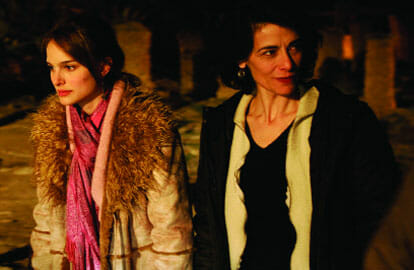
Frustrating mix of personal and political robs film of power
Director: Amos Gitai
Writers: Amos Gitai, Marie-Jose Sanselme
Cinematography: Miguel Markin
Starring: Natalie Portman, Hana Laszlo, Hiam Abbass
Studio info: Agat Films & Cie, 90 minutes
Amos Gitai’s Free Zone opens with a punch to the gut: an unbroken, 10-minute close-up of Natalie Portman crying. Seated in the back of a car, she lowers her window long enough to feel sprinkles of rain on her face while a mournful chanteuse sings a Hebrew song about a circle of killing. Finally, raising the window, she tells the unseen driver to go, drive, leave—she has to leave this country.
The country is Israel, the city is Jerusalem, and Free Zone is an alternately fascinating and frustrating road trip across the borders of the Middle East. Israeli-born Portman plays Rebecca, an American who strikes up a friendship with both the Israeli woman driving the car and the Palestinian woman they meet on their travels, played respectively by Hana Laszlo and Hiam Abbass, both excellent.
The story obviously carries symbolic weight, but information about each character’s history undercuts the power of the opening scene. Rebecca’s tears, we learn shortly, are caused not by Israel or Palestine but by the infidelity of her fiancé, a revelation that makes you wonder why Gitai used the scene the way he did.
Is he deliberately cheapening the woman’s feelings, is she his proxy for America, and is he toying with our assumptions? Or is he personalizing the Middle East’s political struggles by watching three women bicker and bond over the details of their lives? He spends enough time on the personal aspects—strangers tell their life stories to Rebecca with remarkably little prompting—that he doesn’t seem to intend a scathing critique of his characters. Still, when the “free zone” of the title turns out to be a used car lot nestled between Saudi Arabia and Iraq, it’s not clear whether he’s smirking or nodding hopefully.
There’s an art to ambiguity—there really is. Raising questions can be as fruitful as answering them, which is why those first 10 minutes, devoid of context but freighted with meaning, are riveting. Left to their own devices, viewers will fill in the blanks, but when the movie starts filling them in itself, you have to wonder about the mismatch.
The most frustrating thing about Free Zone is that it comes awfully close to this productive provocation, and the movie is frequently lyrical, especially in the opening and closing shots of Rebecca, in the flashbacks—banal on their own, but neatly superimposed over the open road, which links them directly to each woman’s trodden path—and in conversations that repeatedly begin as negotiations for authority and for preferred language. The women cross Israel and Jordan, and Rebecca comments on the history of the land they’re passing through, but Gitai seldom swings the camera around to show their surroundings, preferring to keep it pointed at the car’s interior, a maddening decision that, nevertheless, echoes the opening scene in which the camera refuses to cut away from Portman’s face. What, then, should the viewer wish for—a consistent formal structure or a camera willing to let its world be as big as it needs to be?
An allegory like Free Zone needs to work on both its levels. It may be coordinating its characters like nations and carrying all of the macro-truths of the universe on its abstract frame, but if the personal moments—the lengthy speeches, the comforting hands on troubled shoulders—feel contrived, then it misses both of its targets: the heart and the head.